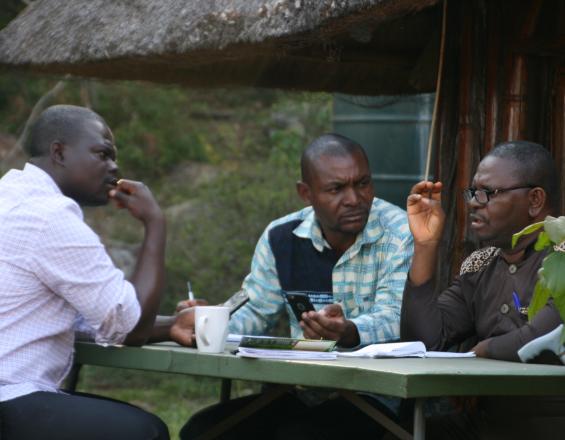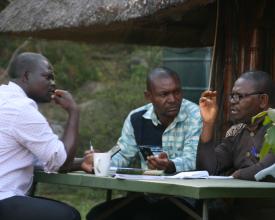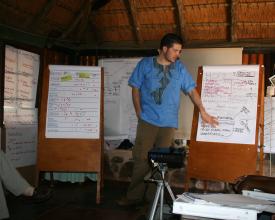Improving protected area management through business skill-sharing partnerships

Earth Skills Network (ESN) is a collaboration between Earthwatch, UNESCO, IUCN and businesses. It connects leaders from the business and conservation communities through mentoring and skill-sharing opportunities. The knowledge gained through this global network provides new resources and tools to safeguard the future of vital conservation areas.
Context
Challenges addressed
Protected areas are the cornerstone of international efforts to conserve biodiversity. They safeguard vital ecosystem services, upon which communities and businesses depend. Yet protected areas face a broad range of challenges with many sites struggling to meet minimum standards. A lack of key organisational, management and business skills is a contributing factor, but protected area managers rarely have the opportunity to train in these fields.
Companies have a wealth of experienced staff and devote significant resources to effective business management. However, there are often few opportunities for their managers to consider the value of natural resources to the business.
Location
Process
Summary of the process
Most protected area managers are trained conservation professionals, which gives them a solid grounding to respond to a wide range of challenges, but means they may lack business and management skills. The challenges they must address go beyond those relating to ecosystem health and include those related to running organisational systems and processes. If a protected area lacks organisational effectiveness then it will be compromised in its ability to deliver conservation outcomes.
Companies can offer experienced staff and expertise on key methods for business management. By training business leaders as mentors, ESN can help sites to take a more strategic approach. Furthermore, ESN benefits business by allowing senior staff to understand the value of natural resources to businesses and society, and how business decisions can impact on protected areas.
Building Blocks
Identification of Protected Areas who will benefit
ESN provides training and mentoring to protected area managers to build organisational management skills, thereby supporting management effectiveness.
Each year, six African protected areas each nominate three representatives who will benefit from the input of business planning guidance, personal skills development and support for the duration of one year. Protected areas are selected through a competitive application process. ESN is open to UNESCO World Heritage Sites (including sites on the tentative list), IUCN natural protected areas, protected area agencies, management authorities, local governments and NGOs with management remit. The programme is targeted at protected area managers who are in positions of responsibility that allow them to instigate management and planning changes, and who have the support of their senior management.
To ensure the programme is effective in driving organisational change, ESN works with protected areas that demonstrate a clear need for training in organisational, management and business skills. For sites that have severe challenges (i.e. lack of political support, severe lack of resources or security issues), enhancing these skills may not have a discernible impact.
Enabling factors
Effective outreach to protected areas in Africa, with a focus on site managers, management authorities and related government departments. Full commitment from members of staff, including senior management, to implementing organisational changes identified through the ESN process. Ongoing access by the protected area managers to communications systems (telephone and internet). Ability of staff to join training where the primary language is English.
Lesson learned
Earthwatch invests significant resources into a robust application, interview and selection process to ensure that the enabling factors are in place. Identifying protected areas which need the training, have the resources to fully take part, and have the right level of senior buy-in is a huge determinant of the long-term impacts and success of mentor-mentee relationships.
Mentor identification and training
ESN training and mentoring is delivered to protected areas by Business Mentors recruited from ESN business partners. Business Mentors have a range of business planning experience and expertise; for example, working in finance, marketing, operational management and human resources. They must also demonstrate the requisite personal and professional leadership attributes to perform as successful mentors and trainers.
Business Mentors will first attend a Mentor Development Course which will train them to apply their existing skills and knowledge to a protected area context. Trained mentors and protected area managers are then brought together on a Residential Training Programme, set in an inspirational natural setting where they will have the opportunity to share their experience and build the mentoring relationship.
Enabling factors
ESN Business Mentors have the leadership attributes and well-rounded business experiences required to become good mentors. Business Mentors undergo an immersive and intense week-long training programme, which helps them to develop their skills and understand the protected area context.
Lesson learned
The protected area application process is conducted prior to the mentor application process. This allows mentors to be identified that match the specific business needs of the protected area. Mentors are selected through a competitive application process to ensure that the enabling factors are in place.
Building effective mentor-mentee relationships
Once protected areas and Business Mentors are matched, they are brought together on a 10-day Residential Training Programme, set within an inspiring and relevant protected area setting. This aims to: build relationships between Business Mentors and protected area managers that allow for effective ongoing mentoring and collaboration; develop business and leadership skills that enable protected area managers to perform better in their roles and manage the protected area more effectively; build a clear action plan for enhancing management effectiveness; provide an opportunity for networking between African protected areas; and build a shared understanding of the importance of effective protected areas, and the possible impact of business decisions. Following the residential training, protected areas and their mentors work together in a mentor-mentee relationship for at least 12 months. Mentoring from this point is usually conducted remotely, although mentors sometimes visit their site to support the roll-out of business planning activities.
Enabling factors
Business Mentors deliver the training, which is guided by an 11-step business planning process and a Business Planning Toolkit (developed by Shell Foundation and UNESCO). In parallel, Earthwatch learning professionals provide training and coaching in leadership and management skills to both protected area managers and Business Mentors. The Residential Training Programme builds strong relationships that continue into the remote mentoring period. Committment to the implementation of action plans through ongoing colloaboration and partnership.
Lesson learned
Developing the less tangible ‘soft skills’ of protected area staff (e.g. leadership and communication skills) is just as crucial to success as the business planning content. The ESN Residential Training Programme includes activities and discussions that develop protected area manager confidence, capability, competence and skills that influence their ability to put the learnings into practice.
Impacts
Cross-sector skill-sharing partnerships have many applications. Over the past nine years the programme has partnered 52 Business Mentors with 148 staff from 51 protected areas across Africa and Asia. As well as sharpening their professional competencies, business leaders build constructive dialogue with protected areas, which helps them to increase their understanding of protected areas and environmental and social sustainability. https://earthwatch.org.uk/get-involved/projects-activities/earth-skills-network
Beneficiaries
Protected area managers (at site, management authority or local government level). Business professionals from ESN partners receive training as Business Mentors.
Sustainable Development Goals
Story
Mole National Park, Ghana, is a key wildlife area for elephants and antelopes and is considered an important site by Ghana’s Wildlife Division, which is responsible for all wildlife in the country and administers the protected areas. Andrew Stevenson is a Global Account Manager from Shell. With a background in strategic planning and previous commercial experience in Ghana, Andrew made an ideal business mentor for Farouk Dubiure, the Park Manager at Mole National Park.
Prior to ESN, Farouk and his team had little exposure to business planning and marketing. Andrew brought a wealth of experience and supported Farouk in these areas during the Residential Training Programme and through ongoing mentoring.
The Residential Training Programme facilitated open discussion between Andrew, Farouk and his team on the needs and challenges of Mole National Park. They worked together to write an action plan to focus on priority needs for the protected area.
Over the 12-month mentoring period, Andrew helped Farouk and his team apply their learnings and implement the action plan. Actions included:
- Developing a proposal to finance the upgrading of road infrastructure and the park’s facilities to enable Mole National Park to become more accessible and attractive to eco-tourists. Through this, they secured US$ 30,000 to upgrade critical game-viewing roads.
- Developing a marketing plan to increase the visibility of the park. They have since developed a new website on Mole National Park (with the support of a partner) which is helping to attract new visitors to the area. The marketing plan is also allowing them to advertise their new luxury lodge to a different customer base.
- Identifying and targeting potential sources of funding to help achieve the park’s conservation objectives. For example, Mole National Park successfully sourced over US$ 130,000 from the African Elephant Fund for the conservation of the park’s elephants.
Participating in ESN has enabled Farouk and his team to further develop their stakeholder skills. The Northern Regional Manager of Ghana’s Wildlife Division commented that “The ESN programme is showing a visible impact. Since receiving mentor support, [Farouk] is networking and collaborating more with organisations and attracting more development projects for the protected area.”
Andrew was inspired and motivated by his experiences of working with a protected area. This experience has benefitted his stakeholder engagement in sustainable development.




